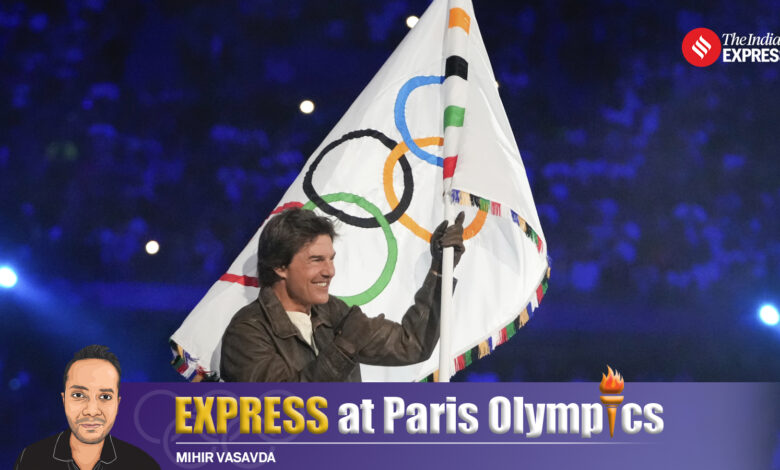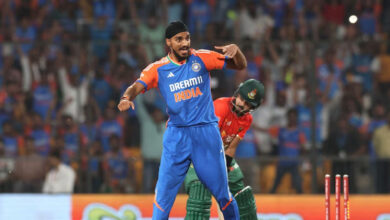To match Paris 2024, Los Angeles faces Mission Impossible | Sport-others News

Tom Cruise abseils from the roof, sprints towards the stage, picks up the Olympic flag from Simone Biles and zooms out of the Stade de France on a motorcycle. A Hollywood ending that few saw coming. And that marked the beginning of a mission impossible for the organisers of the 2028 Los Angeles Olympics — to go one up on Paris.There might have been no warm bienvenue from the grumpy, anxious Parisians when the Games came to their doorstep. But when the time came to bid au revoir, they found it hard to let go of this magical fortnight.
“We saw ourselves as a people of diehard moaners. Instead, we found ourselves a nation of wild supporters,” Tony Estanguet, an Olympic champion and the organising committee head, said during Sunday’s closing ceremony.
Even Estanguet sounded disbelieving as he said those words to a joyous crowd of 80,000-plus people. For 17 days, they shed the boring stereotype of the French being notoriously cynical and turned into hardcore optims.
Participants attend the 2024 Summer Olympics closing ceremony at the Stade de France. (AP)
The only thing over the top were the smiling faces. Everything else was subtle, unpretentious and brave artically — simply put, it was Paris being Paris.
There was a nod to the past. The medal bearers, who blend into the background, paid an ode to the 1924 Paris Games outfits in their Louis Vuitton retro polo shirt, roomy pants and a traditional Gavroche cap. There was a hopeful peek into the future as well. Depicted in the vibrant official poster — the “stadium city and utopian version of Paris” — cartoon Ugo Gattoni.
But mostly, the Parisians — coming off a long period of political instability — wanted to stay in the present.
“Nostalgia can be tedious,” said Jean, manning the security at Champ-de-Mars Arena. “Earlier, we only spoke about the 1900 and 1924 Olympics, the shooting of live pigeons and the marathoners who were given wine. But we weren’t there, neither were our parents or grandparents. But in these Games, we could feel it, experience it. And even if there will be no tomorrow, we will remember it.”
Fireworks signal the end of the 2024 Summer Olympics closing ceremony taking place at the Stade de France. (AP)
These weren’t just one of the best Olympics ever, Paris may have also rescued the brand Olympics. After the financial and infrastructural issues at Rio 2016 and the pandemic-hit Games of Tokyo 2020, the Games were fighting for relevance. Too big and too out of touch were the big challenges it faced.
Paris showed the size of investment could be scaled down with a little imagination. They created temporary venues in breathtaking settings.
This allowed them to not construct new stadiums that end up being nothing but white elephants and come at a heavy cost to the exchequer — a lesson for future hosts, especially India, which is eyeing the 2036 Olympics.
Japan spent $13 billion to host the Tokyo Games. The Paris Olympics are estimated to cost almost $5 billion less. It will take months to know exactly how much money was splurged.
The temporary venues were carefully designed so that the spectators in the stands as well as the television audience could take in the beauty. At the Grand Palais, the eyes were as much on the swooshing swords of the fencers as the magnificent dome they competed under.
The Eiffel Tower Stadium, which hosted beach volleyball, was easily the most snapped arena, especially in the night when the tower sparkled. The walk through the gardens of Château de Versailles to reach the stands of the equestrian arena gave a sense of being at a truly horic place.
Those Parisians who fled the city anticipating trouble — of an overcrowded public transport system and high security — were the victims of ‘FOMO’.
The first post-Covid Olympics saw every venue brimming with fans. Early in the morning, they grabbed their coffees and croissants to queue up outside for judo and table tennis; night, they’d be chugging beer at swimming and athletics.
There would be emotional renditions of the La Marseillaise, the French national anthem, and ferocious chanting of the names of their new heroes.
Leon Marchand of France, stands on the podium after receiving his gold medal for the men’s 200-meter individual medley final at the 2024 Summer Olympics, Friday, Aug. 2, 2024, in Nanterre, France. (AP Photo/Ashley Landis)
One evening, hundreds at a cafe on the banks of the Seine (a proper tour trap) were glued to their mobile screens, watching swim sensation Leon Marchand going for his fourth gold medal. When he touched the wall, there were impromptu celebrations: strangers, young and old, hugging each other, crying and dancing; emotions only sport can trigger.
Estanguet was right when he said: “We searched for inspiration. We found Leon Marchand.”
Indeed, there were issues. The athletes were made to wait in long queues for food, which wasn’t always enough to fill their appetites. And they were ferried to the stadiums in unpunctual buses that felt like saunas.
The unsavoury gender debate surrounding Algeria’s Imane Khelif triggered debates over the athlete and human rights. And swimming in the murky, E. coli-filled waters of the Seine turned out to be the biggest adventure sport.
The Eiffel Tower is seen on the river Seine (Reuters)
Parisians might not be the most sentimental people. But the thought of reclaiming the river on which the city is built makes them giddy; so does the idea of taking a dip in the water next summer, the first time since 1923.
The legacy of these Games could also be the regeneration of the poor suburbs of Seine-Saint-Denis, which hosted several events, including the closing ceremony, and was the site of the Athletes Village.
Simon Kuper, the author of Impossible City: Paris in the Twenty-First Century, said these things — cleaning up the Seine and uplifting Saint-Denis — had been in the works for decades. “But the deadline was hurried because it had to open for the Olympics,” Kuper said.
The sport at the Olympics is always jaw-dropping. But it’s these factors — being creative in stadium construction, regenerating underprivileged regions, making it accessible to all and keeping it within budget — that will be lessons, and a challenge, for future hosts.
The International Olympic Committee president Thomas Bach called Paris 2024 a “sensational Olympic Games from start to finish”.
The five rings on top of the Hollywood mountain was a great teaser to Los Angeles 2028. How the world will look in four years and what happens to the big stars who shone in the last fortnight, nobody knows.
But as Humphrey Bogart said in Casablanca, “We’ll always have Paris”.






